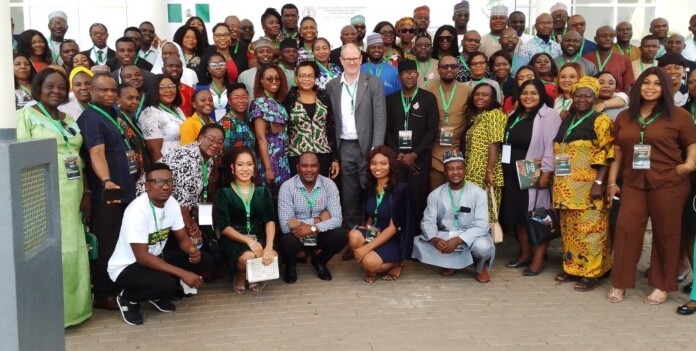…As NLC, FG seek improved collaboration to address challenges
By Michael Oche
A network of Civil Society Organizations (CSOs) has said that while much attention has, over the years, been given to international migration by the government and stakeholders, internal migration holds an array of opportunities for national development and integration and should not be ignored.
“Internal migration is a ubiquitous phenomenon that has often been overshadowed with the focus on international migration,” Dr Emeka Xris Obiezor, National Coordinator of the Civil Society Network on Migration and Development, Nigeria (CSOnetMADE), said in Abuja on Tuesday at the 2023 Civil Society Forum (CSF) on Migration and Development.
The CSF on Migration and Development which started in 2021 is an annual convergence of Civil Society Organizations and other stakeholders in migration space to discuss how to improve migration governance in Nigeria.
The theme for the 2023 CSF is, “Uncharted Territory: Exploring Challenges and Opportunities of Internal Migration in Nigeria – Advancing Solutions and Partnership”
Dr Obiezor said this year’s theme reflects the complexity and significance of internal migration which deserves our attention.
“Predicated on the National Migration Dialogue (NMD) theme, “Leverage Youth Migration for National Development,” the 2023 CSF turns our gaze to an uncharted territory within the interface of our youth migration and national development,” he said.
According to him, “In 2021, the International Organization for Migration and UNICEF conducted a research survey which shows the prominence of internal migration in Nigeria.
“The survey emphasized the push and pull factors of internal migration which include economic opportunities, employment, healthcare, education among others, with Lagos and Abuja recorded as the destination of most internal migrants. The demographic analysis of the survey shows a high percentage representation of the youth population. Although internal migration has its challenges, it does hold a ray of opportunities for national development and integration that should not be ignored. Thus, the reason why we are here.”
In his goodwill message to the event, General Secretary of the Nigeria Labour Congress (NLC) Emmanuel Ugboaja, said despite being a significant driver of societal transformation with its potential and challenges, internal migration dynamics often is not popular amidst the focus on international migration discourse and programmes.
Ugboaja who was represented by Comrade Uche Ekwe, the head of International Desk at the NLC, said we must engage in discussions and devise strategies to manage internal migration and its ripple effects on external or international migration.
According to him, “The non-recognition of internal migration has resulted in a lack of attention and resources being directed towards addressing the dynamics of internal migration, the challenges faced by internal migrants and its consequences on the overall national migration governance.
He said, “internal migration in Nigeria is historical, dynamic, and inherent in our society with enormous consequences that are both positive and negative for the well-being and livelihoods of millions of individuals.
“While internal migration holds the promise of improved economic opportunities, access to education, and social amenities, it also exposes a reasonable proportion of the population to vulnerabilities. These include child and women trafficking, modern-day slavery, forced labour, and the perilous journey of irregular migration, slavery, forced labour, and other forms of exploitation.
“The recent surge of mass movement of people from rural to urban areas occasioned by insurgence, violent conflicts, herders, and farmers’ crises, banditry, and climate change is putting strain on resources, infrastructure, and social systems, leading to social tensions, potential conflicts, and possible irregular migration across international borders.”
The General Secretary expressed the commitment of the NLC to continue to collaborate with the CSOs and other stakeholders on the need to effectively tackle the issues bedeviling internal migration, including contributing to promoting government structures for migration governance.
In his address, Mr Tijjani Aliyu, the Federal Commissioner, National Commission for Refugees Migrants and Internally Displaced Persons, NCFRMI, said the Commission is seeking ways to mainstream internal migration into the national migration policy, which it hopes will change the narrative, especially since the country is already in the process of review.
The Commissioner who was represented by the Head of migration division said, “There’s also been a lot of focus on return, bringing our migrants back, and we felt we needed to interrogate a bit of issues on internal migration.
“I know two years ago, CSOnetMADE had a survey around the north-west on issues of internal migration. And we felt there’s a lot going on within Nigeria arising from internal migration. We have the herder-farmers clashes, a huge displacement caused by climate change, and other forms of violence, that made Nigerians move around.
“So I will say the theme of the Forum this year is apt. We needed to look at internal migration dynamics, the trends and see how we could see the challenges and also the benefits and then basically have a win-win situation.
“We have been concentrating a lot on international migration, but we need to look inwards to know how many persons who are not Nigerians are within Nigeria; I’m talking about migrant workers. How many of them are documented, how many of them are vulnerable? How many of them are actually being trafficked. Trafficked in here or trafficked out; or even retrafficked.
“So we would like to charge you to look inwards and see if we can get data on migrants within Nigeria: migrant workers or just migrants. As you’re aware, we are not only a destination country, we are also a transit country.”







